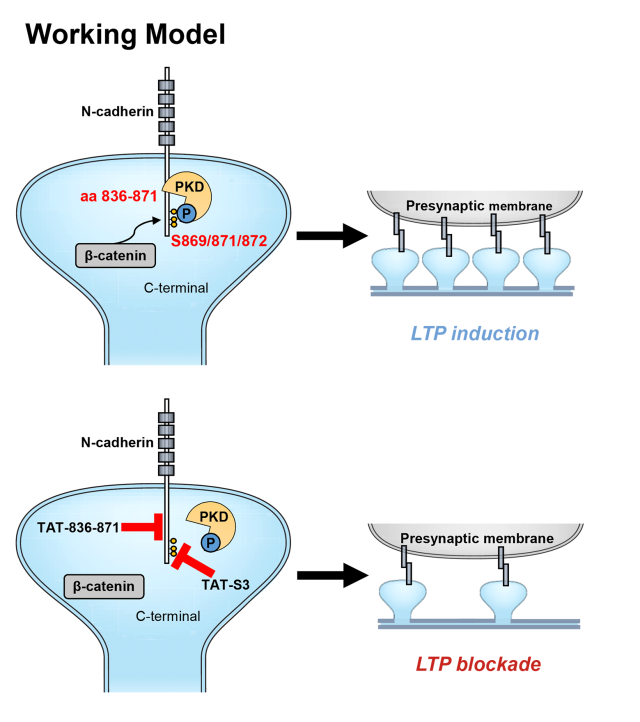Yun Wang’s group has recently published a paper on Journal of Neuroscience titled “PKD1 promotes functional synapse formation coordinated with N-cadherin in hippocampus” and demonstrated the critical signaling pathways in regulating the synaptic function and plasticity in hippocampal neurons during the late phase of neural development (Cen et al., 2017).
Functional synapse formation, maturation and remodeling are critical for the wiring of neural circuits in the developing brain. Defects in synapse formation and function lead to various neurological diseases and have been implied to play important roles in the emergence of Autism, Alzheimer's disease and Parkinson's disease. However, the mechanisms underlying the regulation of synapse development are far from clear.
The cell adhesion molecule N-cadherin plays important roles in target recognition and synaptogenesis. Combined with molecular and biochemical study, morphological study and patch-clamp electrophysiology, Yun Wang’s group showed that protein kinase D1 (PKD1) directly binds to N-cadherin and phosphorylates it, thereby increasing the surface localization of N-cadherin and promoting functional synapse formation during the late phase of neural development in hippocampus. Intriguingly, neuronal activity enhances the interactions between N-cadherin and PKD1, which are critical for the activity-dependent growth of dendritic spines. Accordingly, either disruption the binding between N-cadherin and PKD1 or preventing the phosphorylation of N-cadherin by PKD1 leads to the reduction in synapse number and impairment of long-term potentiation (LTP).
This study demonstrates a novel mechanism of PKD1 regulating the surface localization of N-cadherin in synapse development and contributes to the research for neurodevelopment and the therapy for neurological diseases.
This work was supported by grants from the National Natural Science Foundation of China (81600989 to C.C., 31530028 and 31720103908 to Y.W.), the Ministry of Science and Technology of China (2014CB542204 and 2015BAI08B02 to Y.W.) and China Postdoctoral Science Foundation (2015M580025 to C.C.). C.C. was supported in part by the Postdoctoral Fellowship of Peking-Tsinghua Center for Life Sciences.
Cen C*, Luo LD*, Li WQ, Li G, Tian NX, Zheng G, Yin DM, Yimin Zou, Wang YCA. PKD1 promotes functional synapse formation coordinated with N-cadherin in hippocampus. J Neurosci. 2017 Nov 13. pii: 1640-17. doi: 10.1523/JNEUROSCI.1640-17.2017. [Epub ahead of print]

PKD1 binds to N-cadherin at amino acid residues 836-871 and phosphorylates it at Ser 869, 871 and 872. Disruption of the modification of N-cadherin by PKD1 impaires the binding of N-cadherin to β-catenin and the membrane localization of N-cadherin, thereby inhibiting synapse formation and synaptic plasticity.